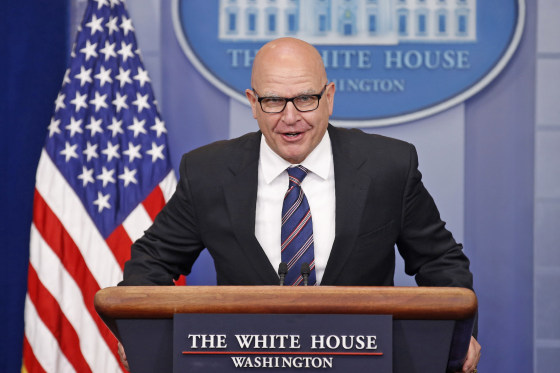WASHINGTON — National Security Advisor H.R. McMaster defended President Donald Trump's decision to share sensitive intelligence with Russian officials during last week's visit as "wholly appropriate" amid a firestorm of criticism Tuesday.
The White House was in damage control mode over media reports Monday that Trump disclosed highly classified information from an ally with Russia. NBC News confirmed Tuesday that Israel was the key partner that provided the ISIS-related intelligence, according to three government officials with knowledge of the matter.
Related: LIVE BLOG: White House Scrambles After Trump’s Gives Russia Intel
McMaster said the president shared the information in “context of the conversation” with Russian Foreign Minister Sergei Lavrov, saying it was “wholly appropriate to that conversation” and “consistent with the routine sharing of information between the president and any leader with whom he’s engaged.”
McMaster would not confirm if that information was classified.
"I was in the room, the Secretary of State was in the room, as you know, the deputy adviser for national security, Dina Powell, and none of us felt in any way that conversation was inappropriate," McMaster said.
During those conversations, Trump also disclosed the city in ISIS-held Syria from which that intelligence emanated, McMaster confirmed.
“It was nothing that you would not know from open-source reporting," McMaster said.
The president “wasn’t aware of where this came from. He wasn’t briefed on the source of this information,” McMaster said.
Two U.S. intelligence officials told NBC News that many people inside the U.S. intelligence community dispute McMaster’s characterization that Trump’s sharing of sensitive terrorism intelligence with the Russian foreign minister and the Russian ambassador was “appropriate.”
Normally, when the U.S. government wants to share intelligence with Russia, there is an elaborate vetting process, current and former officials told NBC News. Sometimes the reports are marked “REL Russia,” for “releasable Russia.”
RELATED: Trump Defends ‘Right’ to Share Info With Russia After Classified Intel Reports
“There is a process for sharing releasable intelligence with the Russians,” Eric Pelofsky, a former National Security Council senior director, told NBC News. “For the president, it could take a few hours — and it would be sanitized in a way that would be respectful of the risk. And, likely as part of that process, our intelligence community would engage our intelligence partner so that we would not jeopardize the continuing flow of intelligence from them.”
Following Trump's conversations with the Russians, Homeland Security Adviser Tom Bossert reached out to the CIA and the National Security Agency likely out of “an overabundance of caution,” McMaster said. He added he has not spoken with Bossert about why he reached out.
The intelligence community, the two officials told NBC News, feels Bossert alerted them because Trump shared intelligence about the laptop bomb threat derived from a partner country. They added that U.S. intelligence officials are concerned that the disclosure could compromise the source of the information, will lead the partner to stop sharing, and will make other countries reluctant to share intelligence with the U.S.
McMaster on Tuesday said that he was not concerned that allies would stop sharing information with the U.S. as a result of Trump's conversations with the Russians.
Israeli Ambassador Ron Dermer, while not confirming his nation as the source of intelligence, said in a statement that his country "has full confidence in our intelligence sharing relationship with the United States and looks forward to deepening that relationship in the years ahead under President Trump."
On Monday, McMaster denied that Trump shared “sources or methods” with the Russians — notable wording considering the story first reported by The Washington Post did not report that Trump shared sources or methods, only classified information.
Another White House official, Dina Powell, also offered denial of the reports, calling them “false” in a statement Monday night.
But a series of Trump tweets Tuesday morning flew in the face of those denials, seemingly corroborating the Washington Post’s reporting that information was shared.
“I wanted to share with Russia…facts pertaining…to terrorism and airline flight safety,” the president tweeted.
Trump's sharing information with the Russian officials is the latest turn in a saga that has put the spotlight on campaign and former administration officials and questions into any possible relationship with Moscow.
President Trump may not have violated a law in revealing or discussing classified information, a former senior national security lawyer told NBC News. A president has the ultimate authority in the government to decide what's classified — even if they blurt out or otherwise reveal classified information without a deliberate declassification process.
This is not the first time President Trump has put forth statements that contradict his White House surrogates and spokespeople.
Last week, in an interview with NBC News' Lester Holt, Trump said he would have fired former FBI Director James Comey "regardless" of Deputy Attorney General Rod Rosenstein's recommendation — the opposite explanation offered by chief White House officials, Vice President Mike Pence, Sean Spicer and Sarah Huckabee Sanders in the immediate aftermath of the firing.
On Tuesday, the White House reiterated that they felt “real issue," in information sharing was that national security was being compromised by leaks — a complaint the Trump White House has often voiced.
McMaster said “those violating confidentiality” by releasing information to the press could “make American citizens and others more vulnerable.”


